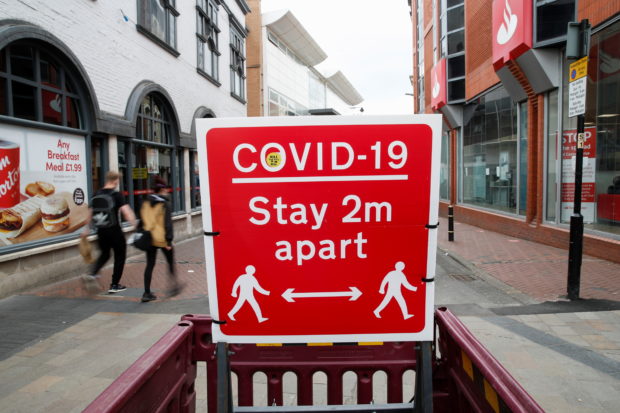UK raises alarm over new South Africa COVID variant which could beat vaccines

FILE PHOTO: A social distancing sign is seen amid the spread of the coronavirus disease (COVID-19), in Leicester, Britain, May 27, 2021. REUTERS/Andrew Boyers
LONDON — Britain on Thursday said it was concerned by a newly identified coronavirus variant spreading in South Africa that might make vaccines less effective and imperil progress made across the world in fighting the pandemic.
The UK Health Security Agency said that the variant – called B.1.1.529 – has a spike protein that was dramatically different to the one in the original coronavirus that COVID-19 vaccines are based on.
Officials characterize the variant, which has double the number of mutations as the currently dominant Delta variant, as the “worst one yet”.
It was only first identified at the start of the week but Britain rushed to introduce travel restrictions on South Africa and five neighboring countries, acting much more swiftly than with previous variants.
“What we do know is there’s a significant number of mutations, perhaps double the number of mutations that we have seen in the Delta variant,” Health Secretary Sajid Javid told broadcasters.
Article continues after this advertisement“And that would suggest that it may well be more transmissible and the current vaccines that we have may well be less effective.”
Article continues after this advertisementBritain announced it was temporarily banning flights from South Africa, Namibia, Botswana, Zimbabwe, Lesotho and Eswatini from 1200 GMT on Friday and returning British travellers from those destinations would have to quarantine.
Javid said that more data was needed but the travel restrictions were necessary as a precaution, as scientists said lab studies were needed to assess the likelihood of the mutations resulting in greatly reduced vaccine efficacy.
Officials have advised the government on the need to act swiftly and pre-emptively in case the concerns over the impact of variant are borne out, even though it could take weeks to generate all the information needed about its characteristics.
Earlier on Thursday, South African scientists said they had detected the new COVID-19 variant in small numbers and were working to understand its potential implications.
The variant has also been found in Botswana and Hong Kong, but the UK Health Security Agency said that no cases of the variant had been detected in Britain.
“Early evidence from genomic surveillance in South Africa suggests that B.1.1.529 is a serious cause for concern,” Ewan Birney, Deputy Director General of the European Molecular Biology Laboratory, said.
“We know that early action is far better than late action. It may turn out that this variant is not as large a threat as Alpha and Delta, but the potential consequences of not acting on the possibility it could be are serious.”